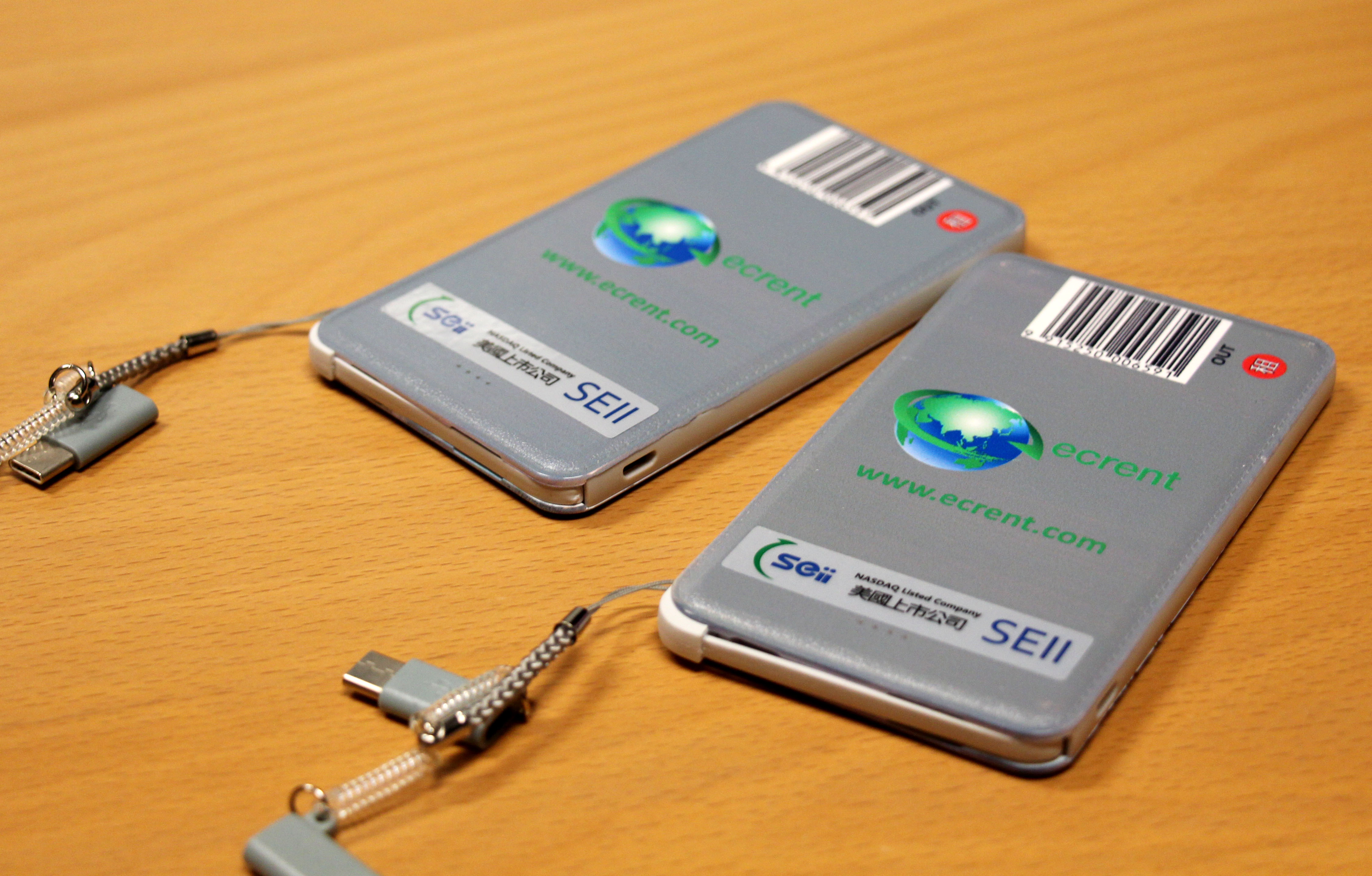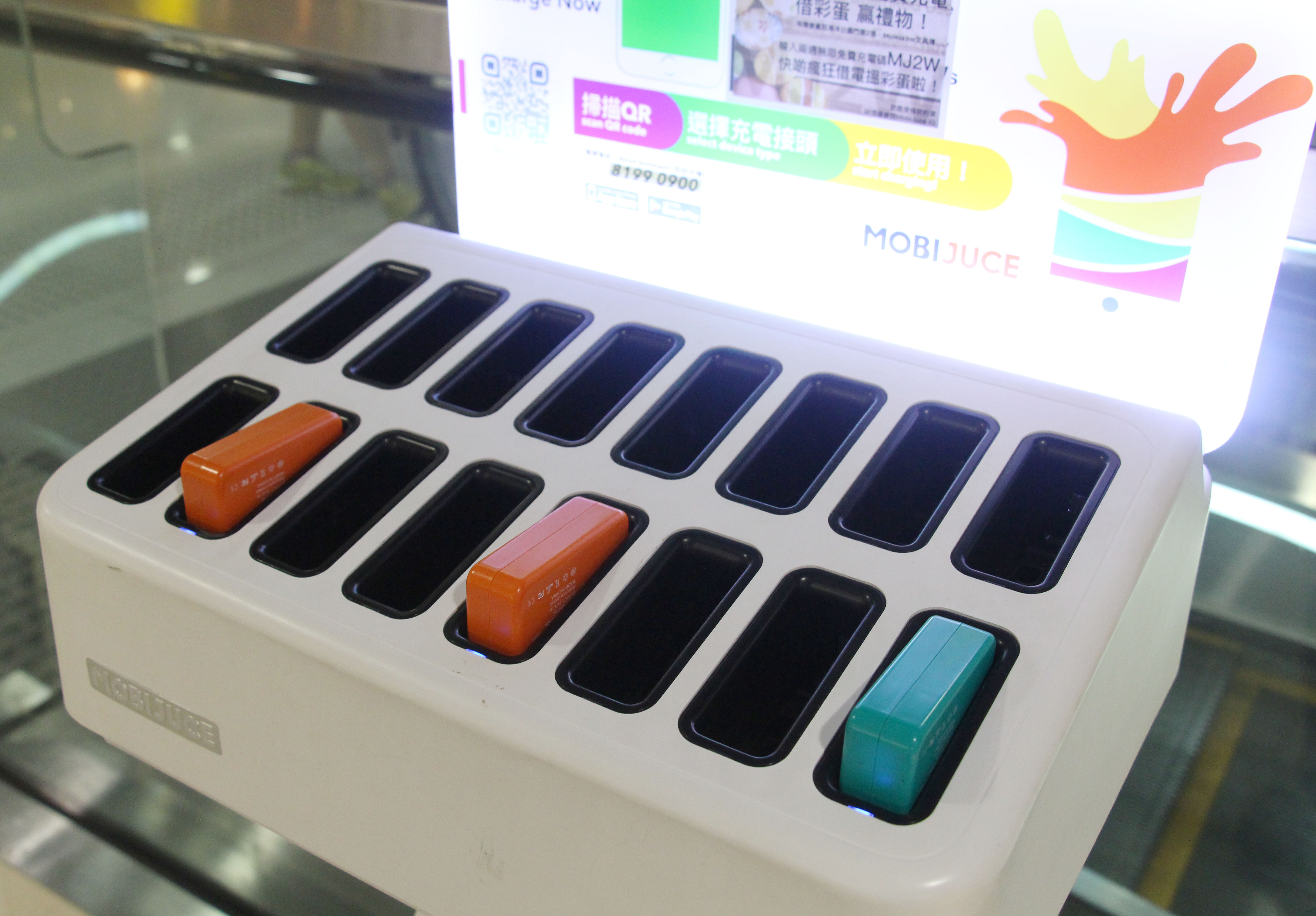Reported by Oasis Li
One of the most horrible accident today might not be forgetting to bring your wallet when you go outside, but having your cell phone out of battery.
People suffer from “low-battery-anxiety” and even “nomophobia”, short for no-mobile-phobia, describing the fear of being cut off from mobile services, according to the researcher of California State University.
In a technology-dependent society like Hong Kong, portable phone charger sharing thus becomes an extension of the sharing economy, as an easy way to solve the “anxiety”.
Since 2017, the sharing portable phone-charger service in Hong Kong has witnessed its boom with several companies. Some of them are mature rental platforms, while others are startups that spot a niche in the field.

Collaborating with 7-Eleven, one of the largest retail network in Hong Kong, ECrent, an American rental platform, took the lead in renting out phone chargers in the city.
The models of shared phone charger business in Hong Kong can be divided into self-help rental mode and providing services through the retail system of convenience shops. ECrent runs as the latter.
“We choose 7-Eleven because of its maturity in market share. Our phone chargers can get access to more users compared with other rival companies,” said Parkson Yip Dik-jin, the Chief Executive Officer of ECrent Worldwide Company Limited.
The face-to-face rental service reduces technical requirements of the users and avoids the common system failure issues other companies suffer from, said by Mr. Yip.
The convenient payment method is one of its strengths. “Automatic system is straightforward, it may fail to rent out the phone charger if users meet difficulties when paying money,” Mr. Yip explained, “But if we run this business through the retail system, users can rent phone chargers successfully by any payment methods accepted by 7-Eleven.”
At the beginning stage of its business, ECrent needs to train more than eight hundred staff of 7-Eleven shops to get familiar with their new service. The human error was quite frequently in the first two months.
However, there are still three to four hundred daily users in the first month when they started running, said ECrent.
“The actual result is higher than our initial expectation,” Mr. Yip said, “It broke through the estimated number within two months to seven to eight hundred users per day and reached one thousand at most.”
Mainland China has one of the most conspicuous shared phone charger markets. According to iiMedia Research, the scale of the market is estimated 28.7 billion yuan ($35.4 billion Hong Kong dollars) and is still growing.
However, several operators met financial problems in the bubble and finally went bankrupt. For instance, LeDian and PP Charging shut down one by one in October 2017.
ECrent believed that those companies invested too much at the beginning without considering the actual needs of the market. Besides, they did not solve the problem of the wastage of phone chargers under the automatic system.
“Continuous damage of phone chargers leads to financial losses,” Mr. Yip said, “Also, the user experience gets worse if the chargers they rent need to be repaired. Then you gain fewer profits because of the loss of customers.”

Nowadays, the concept of sharing economy enjoys great popularity in mainland China and Hong Kong, such as bicycles, portable chargers, furniture and housing.
However, not all of the services can be qualified as part of the sharing economy, which originally refers to peer-to-peer (P2P) based on the sharing of access to goods.
Francis Fong Po-kiu, the founding chairman of Hong Kong Association of Interactive Marketing, believed the shared portable charger cannot be viewed as part of the sharing economy and it is not a sustainable business.
“The shared economy is actually that you use your own economy your own stuff to share with others,” said Mr. Fong, “Otherwise you are just a provider buying thousands of phone chargers and renting them to the user.”
Mr. Fong also doubted if shared phone-charging companies could obtain enough profits and survive in Hong Kong.
The operating expense to support the service is high since the further market is big and the return rate of customers is low, he said.
“I do not regard the prospects of the company favourable within five to six months,” Mr. Fong added.
While Howard Ling Ho-wan, the Adjunct Associate Professor for Department of Marketing of Hong Kong Baptist University, believed the emergence of shared phone-charger is actually another extension of the sharing economy, extended from Uber, Airbnb and the shared Wi-Fi pocket.
“Now, people use phones much more frequently, but their own battery is not enough for the whole day to use,” Mr. Ling said, “So, you either have one yourself or you either share with everyone.”
Mr. Ling supposed that there is room for two to three players in the Hong Kong market. Otherwise, the competition would be fierce. He also considered that different choices of locations affect the user experience.
“Using the convenience shops like 7-Eleven is a better model than basing on restaurants, hotels or shopping malls,” Mr. Ling said, “Because it’s easy for people to remember, and the locations are much more widespread.”
Mr. Ling thought the emergence of the sharing economy is also related to anti-consumerism, which encourages people not to buy things they don’t need.
He said some people believe that a real sharing economy should be free of charge, but for a sharing service, in a bid to sustain itself it must have an income model.
“At least they give you an incentive not to buy a phone charger for yourself. Anyway, phone chargers are burdens for the environment,” Mr Ling said.


